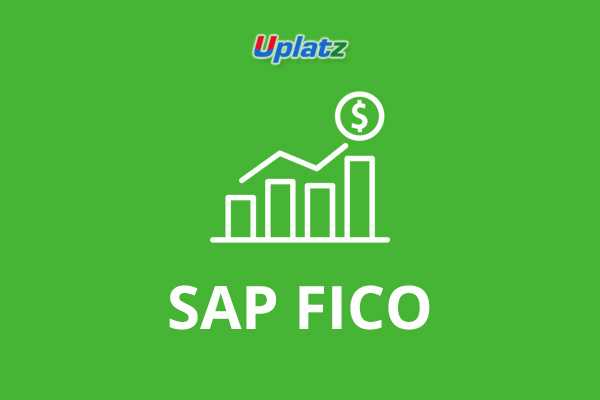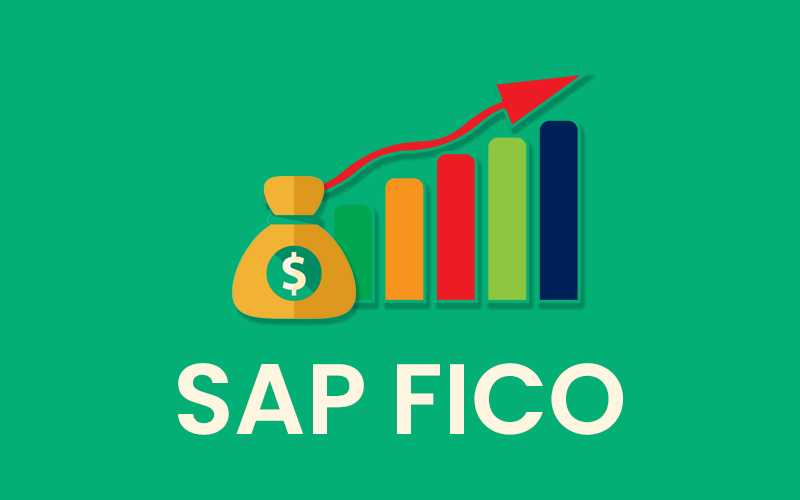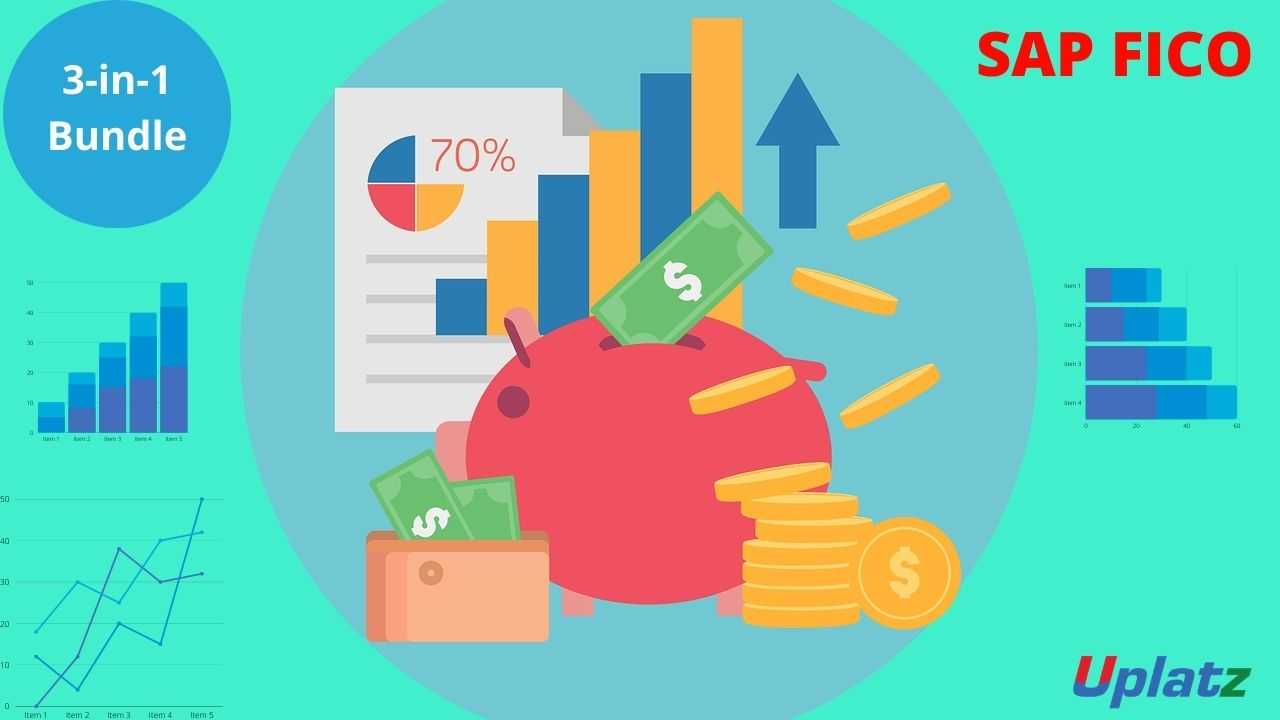SAP FICO (basic to advanced)
Master Financial Management & Control with SAP FICO. Unlock its power for Financial Integration, Real-time Reporting, Cost Analysis, and Compliance. View Course Curriculum
Price Match Guarantee
Full Lifetime Access
Access on any Device
Technical Support
Secure Checkout
Course Completion Certificate
View Course Curriculum
Price Match Guarantee
Full Lifetime Access
Access on any Device
Technical Support
Secure Checkout
Course Completion Certificate
 85% Started a new career
BUY THIS COURSE (
85% Started a new career
BUY THIS COURSE (USD 17 USD 41 )-
 80% Got a pay increase and promotion
80% Got a pay increase and promotion
Students also bought -
-

- SAP FICO (Finance and Controlling)
- 30 Hours
- GBP 12
- 5666 Learners
-

- Bundle Multi (3-in-1) - SAP FICO
- 90 Hours
- USD 27
- 502 Learners
-

- Accounts Payable in SAP
- 10 Hours
- USD 17
- 571 Learners

SAP FICO (Finance and Controlling) is a critical core functional component of SAP ERP Central Component that helps businesses to handle all of their financial data. SAP FICO enables businesses to keep a full record of their financial transactions. SAP FICO is designed to assist organizations in generating and managing financial statements for analysis and reporting, as well as in successful business planning and decision-making.
SAP FICO is divided into two parts: SAP Finance (FI) and SAP Controlling (SC) (CO). Each one is utilised in a certain financial transaction. SAP FI is responsible for financial reporting and accounting in general, whereas SAP CO is responsible for organising and monitoring costs. SAP FI and SAP CO were originally released as separate modules but are now so tightly integrated that many people refer to them as simply one module.
SAP is utilised by a number of major international corporations, with FI and CO allowing for improved financial accounting and reporting administration. SAP FICO module is very strong module and covers almost all business process encountered in various industries. It is one of the very important and broadly implemented modules in SAP.
The key characteristics of SAP FICO (Financial Accounting and Controlling) module are as follows:
1) Integration: SAP FICO is tightly integrated with other SAP modules, such as SD, MM, PP, HCM, etc. This integration ensures seamless data flow across different functional areas and enables end-to-end business processes.
2) Comprehensive Financial Functionality: SAP FICO offers a wide range of financial functionalities to manage an organization's financial accounting and controlling processes. It covers areas such as general ledger accounting, accounts payable, accounts receivable, asset accounting, cost accounting, profitability analysis, budgeting, and financial reporting.
3) Real-time Data: SAP FICO provides real-time access to financial data, allowing organizations to have up-to-date and accurate information for decision-making purposes. Transactions are immediately recorded and updated in the system, enabling timely analysis and reporting.
4) Flexibility and Customization: SAP FICO is highly customizable to align with specific business requirements and processes. It allows organizations to configure and adapt the system to their unique financial structures, charts of accounts, fiscal year variants, and reporting needs.
5) Standardization: SAP FICO promotes standardization of financial processes across an organization. It helps establish uniform accounting practices, chart of accounts, and financial reporting formats, ensuring consistency and comparability of financial data.
6) Audit and Control: SAP FICO provides robust audit and control features to ensure compliance with financial regulations and internal control requirements. It offers functionalities for segregation of duties, authorization controls, document traceability, and extensive audit trails.
7) Reporting and Analytics: SAP FICO offers powerful reporting and analytics tools to generate a variety of financial reports, including balance sheets, income statements, cash flow statements, and management reports. It enables organizations to gain insights into financial performance, profitability, and cost structures.
8) Multi-Currency and Global Support: SAP FICO supports multiple currencies and provides functionalities for managing foreign currency transactions, exchange rate differences, and currency conversions. It also caters to the requirements of global organizations, including country-specific reporting and compliance.
9) Scalability and Performance: SAP FICO is designed to handle the financial needs of small, medium, and large organizations. It can handle high volumes of financial transactions, large data sets, and complex financial structures while maintaining system performance and stability.
10) Training and Support: SAP FICO is backed by comprehensive training and support resources, including user manuals, documentation, online forums, and training programs. Organizations can access a vast community of SAP experts and consultants for guidance and assistance.
11) Continuous Updates and Enhancements: SAP regularly releases updates and enhancements to the FICO module, incorporating new features, functionalities, and industry-specific solutions. This ensures that organizations can leverage the latest innovations to optimize their financial processes.
These characteristics make SAP FICO a powerful and versatile module for managing financial processes, gaining insights into costs and profitability, and supporting informed decision-making within organizations.
Uplatz’s SAP FICO (basic to advanced) course comprises of SAP FI and SAP CO modules with detailed explanation from beginner level to the advanced features and uses. This SAP FICO training course is designed to provide a great combination of learning all of the capabilities while also offering much-needed hands-on experience with the programme. Our SAP FICO certification course will turn you into one of the limited proportions of accounting professionals that know how to use this software.
These two modules are used to carry out specific financial processes. SAP FI module focuses on entire financial reporting and accounting while SAP CO focuses on planning and monitoring costs. From basic concepts to advanced concepts, this SAP FICO tutorial covers all important configuration and implementation procedures of the FICO module, including enterprise structure, assignments, posting periods, general ledgers, documents, accounts receivable (A/R), accounts payable (A/P), Bank Accounting, Asset Management, Cost centre accounting, Profit centre accounting, Cost element accounting, and intercompany accounting.
At the end of the course, you will receive a course completion certificate issued by Uplatz.
Course/Topic - SAP FICO (basic to advanced) - all lectures
-
SAP FICO training materials teaches you in an easy method with step by step. SAP FICO Tutorials are especially designed for all SAP beginners and SAP professionals so that you can configure and implement SAP FICO step by step.
-
In this video, SAP general ledger in which SAP R/3 is highly assorted. R/3 customers have to implement several SAP components to fulfil accounting requirements.
-
In this session you will get to ease this problem, SAP has created a new, flexible general ledger solution in SAP ERP. New G/L merges the classic general ledger with profit centre accounting, special ledger.
-
You can learn about the portray parallel accounting in your SAP System. This enables you to perform valuations and closing preparations for a company code according to the accounting principles of the group as well as other accounting principles, such as local accounting principles.
-
Input and output tax is calculated on revenue or expense items (base amount). The tax amounts are posted to separate tax accounts and refunded by the tax office (input tax) or paid to the tax office (output tax).
-
Document splitting allows you to display documents using a differentiated representation. In the representation, line items are split according to selected dimensions. So, you can draw up financial statements for the selected dimensions at any time.
-
Several company codes are involved in a cross-company code transaction. In a cross-company code transaction, the system posts a separate document with its document number in each of the company codes.
-
The SAP Asset Accounting component is used for managing and supervising fixed assets with the SAP R/3 System. In SAP R/3 Financial Accounting, it serves as a subsidiary ledger to the FI General Ledger, providing detailed information on transactions involving fixed assets.
-
Customer payments are posted into the system to represent the collection of money and the application of this money against Customer liabilities to the company.
-
A large number of outstanding receivables or bad debts can have a not inconsiderable impact on company performance. Using Credit Management, you can minimize your credit risk by defining a credit limit for your customer.
-
We calculate interest on overdue customer accounts and general ledger accounts. Interest can be calculated by using the line items interest or overall account balances.
-
You use Cost Centre Accounting for controlling purposes within your organization. The costs incurred by your organization should be transparent. This enables you to check the profitability of individual functional areas and provide decision-making data for management.
-
This requires that all costs be assigned according to their source. However, a source-related assignment is especially difficult for overhead costs. Cost Centre Accounting lets you analyse the overhead costs according to where they were incurred within the organization.
-
We use Accrual calculation to prevent periodic cost fluctuation in cost accounting. You distribute the irregular cost to the relevant periods in controlling.
-
An instrument used to monitor costs and, in some instances, the revenues of an organization.
-
For short-term monitoring of the indirect costs arising from jobs. They can also be used for continuous monitoring of sub-areas of indirect costs.
-
Overhead orders can collect the plan and actual costs independently of organizational cost centre structures and business processes, enabling continues to cost control in the enterprise.
-
Monitor the costs and revenues arising from activities for partners outside the organization, or activities not belonging to the core business of the organization.
-
Profitability Analysis (CO-PA) enables you to evaluate market segments, which can be classified according to products, customers, orders or any combination of these, or strategic business units, such as sales organizations or business areas, concerning your company's profit or contribution margin.
-
The system aims to provide your sales, marketing, product management and corporate planning departments with information to support internal accounting and decision-making.
-
Document splitting allows you to display documents using a differentiated representation. In the representation, line items are split according to selected dimensions. So, you can draw up financial statements for the selected dimensions at any time.
-
In our SAP FICO training program, you will learn Accounting Customizing I, Financial Closing, Asset Accounting, Basics of SAP ERP, SAP Net Weaver, and SAP Solution Manager, General Ledger Accounting, Accounts Payable, Accounts Receivable, Accounting Customizing, Reporting in Financials.
• Learn how to finish an end to end implementation of SAP FICO in SAP
• Get a head start in the complex technologies of modern day SAP
• Obtain the opportunity to learn more complex things in SAP later (e.g. HANA)
• Learn the basic idea of SAP and its Financial Accounting and Management Accounting processes.
• Learn the concepts of how to use and operate SAP finance and CO modules and will be introduced to SAP Finance integrations with other modules like MM, SD and Production.
SAP FICO (basic to advanced) - Course Curriculum
1. Introduction to SAP R/3
• Introduction to ERP, Advantages of SAP over other ERP Packages
• SAP Implementation methodology
• Overview of different modules in SAP
• Common SAP Terminologies
• Introduction to SAP R/3 FICO
2. Financial Accounting Basic Setup
• System Backbone – Enterprise Structure setup in SAP
• Company code
• Operating Concern
• Controlling area
• Chart of Accounts
• Business Area
• Functional Area
• Credit controlling area
3. General Ledger Accounting
• Deep dive – Chart of Account
• Accounts Groups & Master-data significance
• Driving Factors of Accounting postings in SAP:
a) Document type
b) Number ranges
c) Posting Keys
d) Fiscal year variant
e) Posting period variant
f) Field status variants
g) Exchange rates and Currencies
h) Reconciliation Accounts
i) Retained Earning Account
• Accrual or Deferral Postings
• Parked Document
• Fast Data entry in GL
• Concept of Open-item Clearing
• Tolerance group
• Define Financial Statement Version
• Balance carry forward Balances
• Forex Revaluation
• Reports in SAP for GL Accounting
• Substitution and Validation
4. Accounts Receivable
• Introduction to Sub-ledger – Accounts receivable
• Customer account groups and assignment of number ranges
• Customer masterdata and significance
• Customer Payment Terms and Discounts
• Receiving Down Payment
• Bills Receivable
• Dunning
• Detailed Explanation of Oder to Cash flow in SAP
• FI-SD Integration
• Billing Documents (FI Invoice, SD Invoice, Credit memos)
• Customer Payment and clearing
• Credit management in SD module (Master-data, transaction and reports)
• Reports in SAP for AR
5. Accounts Payable
• Introduction to Sub-ledger – Accounts payable
• Vendor account groups and assignment of number ranges
• Vendor master-data and significance
• Vendor Payment Terms
• Payment Method configuration
• Configuration of Automatic Payment Program, Payment run, Payment Advise
• Detailed Explanation of Procure to Pay flow in SAP
• FI-MM Integration, Configuration of automatic posting
• GR/IR clearing
• Posting of partial Payment & Residual Payment
• Down Payment Paid
• Banking Setup
• Bank Reconciliations Statements
• Creation of check lots and maintenance of check register
• Automatic Clearing
• Reports in SAP for AP
6. Asset Accounting
• Fixed Asset Life Cycle
• Asset master data: Creation of asset master (change/display/block/unblock).
• Define chart of depreciation, Depreciation Area
• Define Automatic account determination
• Defining Depreciation key
• Define Asset Class
• Acquisition or purchase of assets, sale of assets.
• Scrapping of assets, Transfer or retirement of assets
• Asset under Construction and settlement to Final Asset
• Depreciation run
7. Taxation
• Introduction to Tax procedure
• Input Tax / Output Tax
• Withholding Tax
• Reports for Taxation purpose
8. Month Ending Activities
• Important Standard SAP Reports
• Closing in Difference Modules
• Cross-tower dependent closing activities
• Year-end activities
The SAP FICO (basic to advanced) Certification ensures you know planning, production and measurement techniques needed to stand out from the competition.
SAP FICO training [advanced level] is the next level of basic FICO class. This course will cover new general ledger, parallel accounting, tax on sales and purchases, company code transactions, asset accounting, cost center accounting, COPA, etc.
SAP FICO is the Finance and Cost controlling module in SAP ERP, where FI stands for Financial Accounting, and CO stands for Controlling. SAP FICO module is very robust and covers almost all business processes encountered in various industries. It is one of the very important and widely implemented modules in SAP.
SAP FICO Course is designed to prepare you for entry & advanced level jobs and also provides fast-track classes of SAP FICO to working professionals or students of which the standard time duration is 2-3 weeks.
Uplatz online training guarantees the participants to successfully go through the SAP FICO (basic to advanced) Certification provided by Uplatz. Uplatz provides appropriate teaching and expertise training to equip the participants for implementing the learnt concepts in an organization.
Course Completion Certificate will be awarded by Uplatz upon successful completion of the SAP FICO (basic to advanced) online course.
The SAP FICO (basic to advanced) draws an average salary of $110,000 per year depending on their knowledge and hands-on experience.
SAP FICO Consultant? As the market is growing, more and more industries are implementing SAP systems. In the next five years, there will be a huge demand from a financial perspective.
Yes, work in SAP FICO is still excellent and in demand. It is even more helpful if you are from accounting or finance education. Therefore, numerous FICO consultants and end-users work on implementation and maintenance jobs.
Note that salaries are generally higher at large companies rather than small ones. Your salary will also differ based on the market you work in.
SAP FICO Consultant.
SAP RAR/ FI – Testing.
SAP FICO Consulting.
Here are most frequently asked SAP FICO interview questions and answers.
1) Q: What is SAP FICO?
A: SAP FICO is a module in SAP ERP that integrates financial accounting (FI) and controlling (CO) functionalities to manage an organization's financial processes and provide insights into costs and performance.
2) Q: What are the key components of SAP FICO?
A: The key components of SAP FICO are General Ledger Accounting (FI-GL), Accounts Payable (FI-AP), Accounts Receivable (FI-AR), Asset Accounting (FI-AA), Controlling (CO), and Financial Supply Chain Management (FSCM).
3) Q: How does SAP FICO integrate with other SAP modules?
A: SAP FICO integrates with other modules such as Sales and Distribution (SD), Materials Management (MM), Production Planning (PP), and Human Capital Management (HCM) to ensure seamless data flow and end-to-end business processes.
4) Q: What is a chart of accounts in SAP FICO?
A: A chart of accounts is a list of all the general ledger accounts used by an organization. It defines the structure and classification of accounts for financial reporting purposes.
5) Q: What is the purpose of asset accounting in SAP FICO?
A: Asset Accounting in SAP FICO manages fixed assets throughout their lifecycle, including acquisition, depreciation calculation, transfers, retirements, and tracking of asset values.
6) Q: How does SAP FICO support financial reporting?
A: SAP FICO provides various reporting tools and functionalities to generate financial reports such as balance sheets, income statements, cash flow statements, and trial balances based on real-time financial data.
7) Q: What is the difference between FI-GL and FI-AP in SAP FICO?
A: FI-GL (General Ledger Accounting) manages an organization's overall financial accounting, while FI-AP (Accounts Payable) specifically handles the management of vendor invoices, payments, and reconciliation.
8) Q: How does SAP FICO handle cost accounting?
A: SAP FICO's Controlling (CO) component handles cost accounting by providing functionalities for cost center accounting, profit center accounting, internal orders, product costing, and profitability analysis.
9) Q: Can you explain the concept of controlling profitability analysis (COPA) in SAP FICO?
A: Controlling Profitability Analysis (COPA) is used to analyze the profitability of a company's products, customers, business segments, or regions. It helps identify areas of high profitability and supports decision-making processes.
10) Q: What is the purpose of the SAP FICO General Ledger (FI-GL)?
A: The General Ledger component of SAP FICO manages an organization's overall financial accounting, including the recording and monitoring of financial transactions, preparation of financial statements, and handling of period-end closing activities.
11) Q: What is the difference between financial accounting (FI) and controlling (CO) in SAP FICO?
A: Financial Accounting (FI) focuses on external reporting and covers areas such as general ledger accounting, accounts payable, accounts receivable, and financial reporting. Controlling (CO) focuses on internal reporting and includes cost accounting, profitability analysis, and budgeting.
12) Q: How does SAP FICO handle taxation and compliance?
A: SAP FICO provides functionalities for tax calculation, tax reporting, country-specific reporting, and adherence to legal and regulatory requirements. It helps organizations ensure compliance with tax laws and financial regulations.
13) Q: What is the purpose of a profit center in SAP FICO?
A: A profit center is an organizational unit in SAP FICO that represents a self-contained area of responsibility within a company. It helps monitor the profitability of individual business segments, product lines, or divisions.
14) Q: How does SAP FICO support budgeting and planning?
A: SAP FICO provides functionalities for budgeting and planning, allowing organizations to create and manage financial budgets, monitor budget variances, and perform forecasting and scenario analysis.
15) Q: How does SAP FICO handle foreign currency transactions?
A: SAP FICO supports multiple currencies and allows organizations to handle foreign currency transactions by performing currency conversions, managing exchange rate differences, and generating foreign currency reports.
16) Q: What is the purpose of the Accounts Receivable (FI-AR) component in SAP FICO?
A: The Accounts Receivable component in SAP FICO manages an organization's customer invoices, payments, and collections. It helps track and manage customer receivables and supports credit management processes.
17) Q: How does SAP FICO handle bank accounting?
A: SAP FICO's Bank Accounting functionality manages an organization's bank transactions, including bank reconciliation, cash management, electronic bank statement processing, and handling of bank master data.
18) Q: Can you explain the concept of a profit center in SAP FICO?
A: A profit center is a management-oriented organizational unit in SAP FICO that represents a specific area of responsibility for profitability analysis. It helps track and monitor the profitability of individual business segments or divisions.
19) Q: What is the purpose of the Accounts Payable (FI-AP) component in SAP FICO?
A: The Accounts Payable component in SAP FICO manages an organization's vendor invoices, payments, and reconciliation. It helps track and manage vendor payables, supports payment processes, and ensures timely vendor payments.
20) Q: How does SAP FICO support internal orders?
A: SAP FICO's internal orders functionality allows organizations to monitor and control costs and revenues associated with specific activities, projects, or events. It helps track costs, budget utilization, and performance against targets.
21) Q: Can you explain the concept of cost center accounting in SAP FICO?
A: Cost center accounting in SAP FICO involves tracking and analyzing costs incurred by different cost centers within an organization. It helps monitor and control costs associated with specific departments, teams, or functions.
22) Q: How does SAP FICO handle accounts consolidation?
A: SAP FICO supports accounts consolidation by providing functionalities to consolidate financial data from multiple company codes or business units. It helps generate consolidated financial statements and perform intercompany reconciliation.
23) Q: What is the purpose of the Financial Supply Chain Management (FSCM) component in SAP FICO?
A: The Financial Supply Chain Management (FSCM) component in SAP FICO focuses on optimizing and automating financial processes related to credit management, collections management, dispute management, and electronic invoicing.
24) Q: How does SAP FICO handle cost allocation and assessment?
A: SAP FICO provides functionalities for cost allocation and assessment, allowing organizations to distribute or allocate costs from one cost center to another based on predefined rules. It helps allocate shared costs and analyze cost contributions.
25) Q: Can you explain the concept of a fiscal year variant in SAP FICO?
A: A fiscal year variant in SAP FICO defines the organization's fiscal year structure, including the start and end dates of the fiscal year, the number of posting periods, and special periods for year-end activities.
These questions cover a range of topics in SAP FICO and should give you a good foundation for interview preparation or general understanding of the module.









